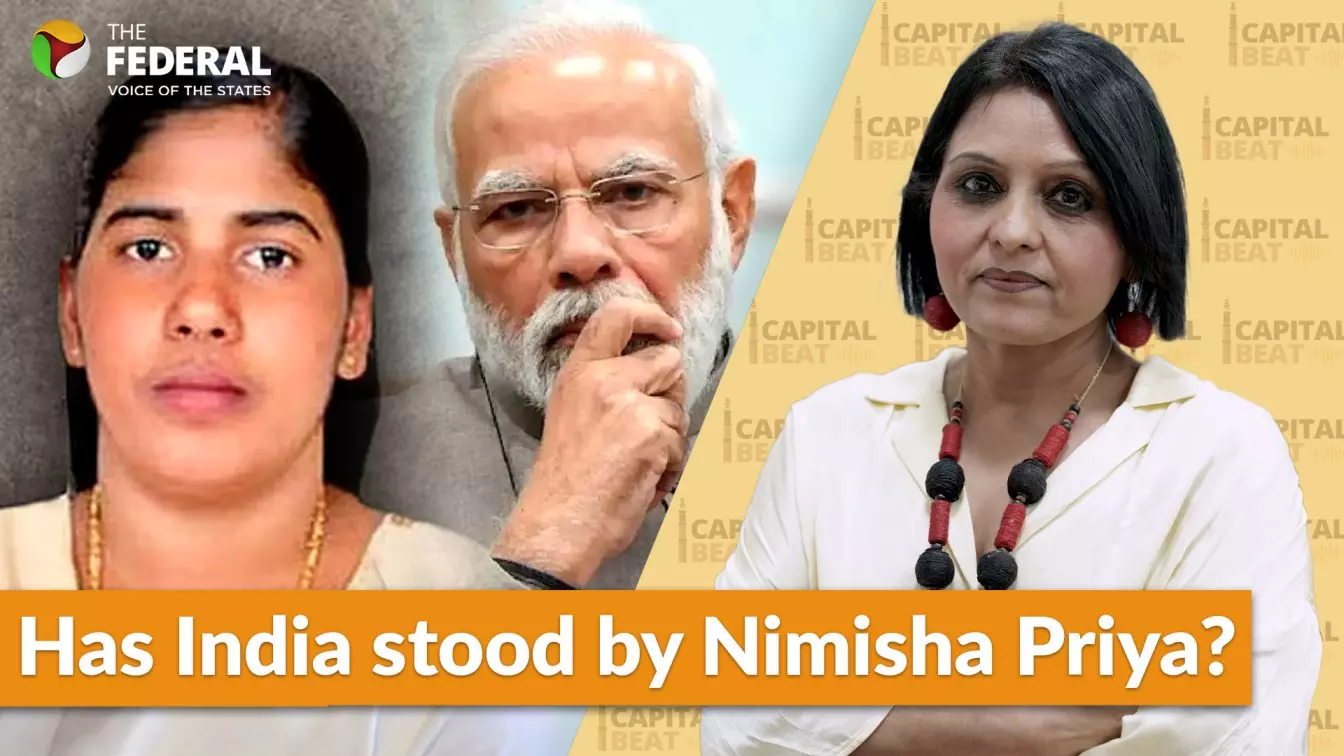
Nimisha Priya's execution deferred, but is India doing enough to save her?
With no diplomatic ties to the Houthis, can backchannel talks and ‘blood money’ save her life? Are Oman, the UAE, and Iran involved? Watch The Federal in conversation with experts

In this episode of Capital Beat, anchor Neelu Vyas hosted a critical discussion on the latest developments in the case of Nimisha Priya, a Keralite nurse facing the death penalty in Yemen. The execution, previously scheduled for July 16, has been postponed “until further notice,” following mounting grassroots and clerical interventions. With India lacking formal diplomatic ties with the Houthi-controlled Yemeni capital Sana’a, panelists dissected the Indian government’s role, diplomatic channels, and the broader implications for migrant Indians overseas. Joining the discussion were Sanjay Kapoor, Editor of Hard News, Subhash Chandran KR, Nimisha’s lawyer, and Dr Aftab Kamal Pasha, an international affairs expert.
Execution delayed, but threat looms
Subhash Chandran KR, lawyer for Nimisha Priya and member of the Save Nimisha Priya International Action Council, confirmed that Yemeni authorities issued a signed order, translated from Arabic, postponing her execution indefinitely. This temporary reprieve was granted amid ongoing negotiations between local tribal leaders and the family of Talal Mahdi, the deceased man whose killing led to Priya’s death sentence.
Also read | Yemen postpones execution of Nimisha Priya amid intense efforts by Grand Mufti of India
Chandran credited the intervention of Kerala-based cleric Kanthapuram Abubakar Musliar, who facilitated the first formal talks between Mahdi’s family and the negotiation team just a day before the scheduled execution. "Now we have enough time to try and convince the family," he said, adding that hopes rested on the victim's family accepting diyya (blood money), a legal provision in Yemen.
Diplomatic paralysis questioned
Dr Aftab Kamal Pasha, an international affairs expert, sharply criticised the Indian government’s passive role, arguing that the Ministry of External Affairs (MEA) has the authority to override Yemen’s travel ban for humanitarian reasons. “Oman, Iran, and even UN agencies could have been leveraged,” said Dr Pasha, highlighting India’s strategic ties with these countries. He labelled the government's conduct as “utter callousness,” especially considering the evidence of abuse and passport seizure that Priya allegedly endured while working for Mahdi.
Dr Pasha also pointed to political hesitations, suggesting that India’s reluctance to engage with Houthi rebels due to its close ties with Israel and the US resulted in missed opportunities for intervention. “If the US can negotiate with Houthis for a ceasefire, why can’t India send a single official?” he asked.
Failure of state support
Journalist Sanjay Kapoor joined the chorus of criticism, branding the government’s actions as “lackadaisical” and emblematic of a deeper indifference toward the lives of ordinary Indians abroad. “About 10,000 Indians are incarcerated in the Middle East, 49 on death row, and there seems to be no plan to help them,” he said.
Kapoor questioned the disparity in treatment between elite and working-class Indians facing legal troubles abroad, citing the swift rescue of Indian Navy personnel from Qatar versus the prolonged struggle in Priya’s case. “It raises serious doubts about whether the government stands by its migrant workers,” he noted.
Action Council steps in
Chandran emphasised that all legal and diplomatic efforts by the Nimisha Priya Action Council have been self-initiated, without financial aid from the government. After multiple denials, the Delhi High Court had to compel the MEA to allow Priya’s mother to travel to Yemen last year. “We are not asking for money. Just facilitation,” he reiterated.
Also read | Nimisha Priya case: Who is Kanthapuram AP Aboobacker Musaliyar, the Grand Mufti?
With the official Indian route closed off, the Action Council is now raising funds through crowdfunding. Chandran expressed confidence that they could match any demand for blood money, citing the Kerala public’s rapid fundraising in similar cases. “We’ve got a proper negotiation channel now. The family is at the table. We’re hopeful,” he said.
Lessons unlearned
Concluding the debate, Dr Pasha and Kapoor stressed that Priya’s case has exposed India’s inconsistent foreign policy. Pasha warned that political biases, like avoiding interaction with Houthis due to international alliances, should not come at the cost of Indian lives. Kapoor described the government's posturing as one of “optics over substance,” with foreign policy choices putting lives like Priya’s at risk.
“This is not just a Kerala issue. It’s a global Indian issue,” said Dr Pasha, adding that India’s claim of being a "Vishwa Guru" rings hollow if it fails to protect its citizens.
(The content above has been generated using a fine-tuned AI model. To ensure accuracy, quality, and editorial integrity, we employ a Human-In-The-Loop (HITL) process. While AI assists in creating the initial draft, our experienced editorial team carefully reviews, edits, and refines the content before publication. At The Federal, we combine the efficiency of AI with the expertise of human editors to deliver reliable and insightful journalism.)

